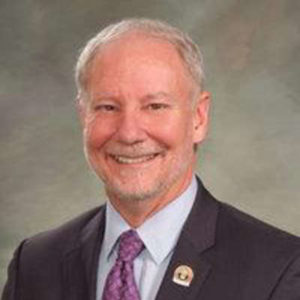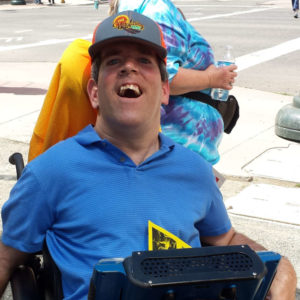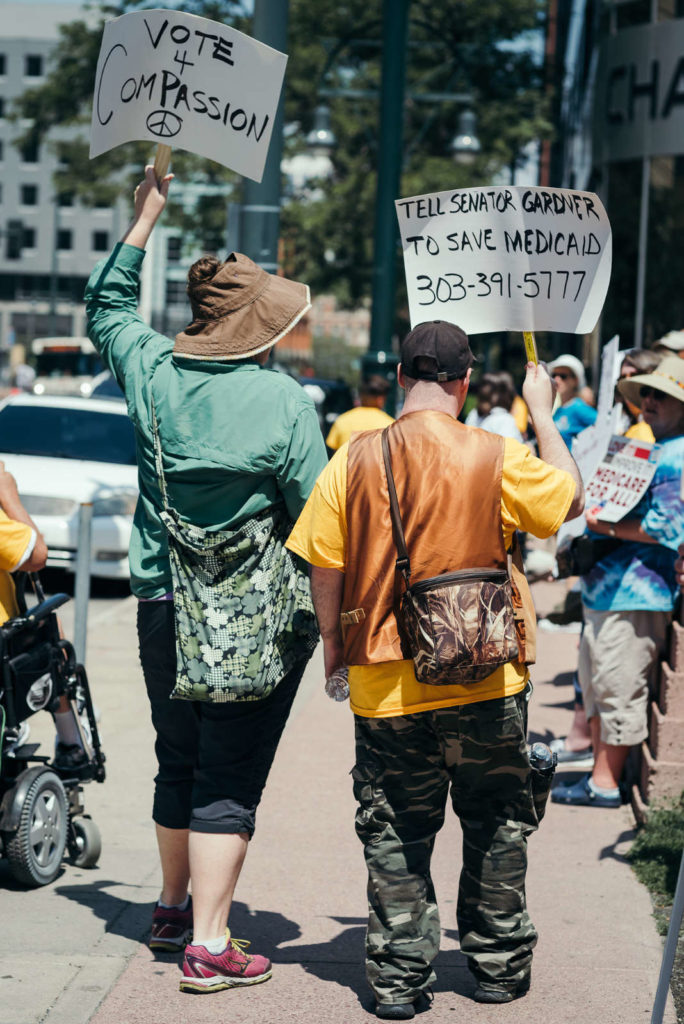
An Interview with Catherine Strode
AdvocacyDenver Board Member and Self-Advocate Mitch McKinney was one of over 400 individuals to protest the proposed cuts to Medicaid in the GOP health bill in a rally held in front of Senator Cory Gardner’s downtown office. Several Colorado legislators also participated in the Medicaid Protest Rally, including State Representative Dave Young. Representative Young spoke at the rally calling the proposed cuts to Medicaid a ‘civil rights issue.’

In an interview with Catherine Strode, Representative Young who serves on the Joint Budget Committee said Colorado would not be able to accommodate the cost shift from federal to state funding.
What dangers to Medicaid are posed by the GOP health bill?
“The biggest danger is it represents a massive cost shift from the federal government to the states when it comes to Medicaid. The state’s budget does not have the flexibility to absorb a massive cost shift like this. It will force us to evaluate and consider every optional benefit we provide under Medicaid. One of those is Home and Community Based Services. We know HCBS is more effective and better at controlling costs than lots of other things and results in tremendously better outcomes for people. This (bill) puts on the chopping block one of the most effective programs we have. That’s happening because everybody’s voice is not in the room. This bill is being crafted in secret, without hearings and without input from people. You end up with bad legislation when you do that.”
What do you mean when you say, ‘Medicaid is more than health care’?
“This is why I talk about Home and Community Based Services. Health care is a piece of that. Certainly, people with disabilities sometimes have significant health concerns that need to be addressed. But it’s not just health. It’s housing. It’s transportation. It’s employment. It’s a lot of other things that don’t necessarily fall under the narrow category of health care. We know when you help the whole person it makes a huge difference. People can be successful in the community when they get the services they need, when they need them. That’s what HCBS does. To eliminate that, we are not just talking about eliminating a person’s health care or reducing their benefits under health care. We’re talking about forcing them into institutional situations that don’t have good outcomes and cost a lot more.”
Why do you label this a ‘civil rights issue’?
“When you talk about what this nation is founded on, it’s not founded on forcing people into untenable situations and reducing or eliminating their independence and opportunities for life and liberty in the community. These are really global and important foundational issues of our country. People need opportunity to be successful. They need options. When they are forced into a single option, it is no longer an option. It’s just a bad outcome for them. That cuts against every foundation of how we believe our Constitution is crafted to protect our citizens. That’s why it is a civil rights issue.”
What is the significance of the Medicaid Protest Rallies?
“You have a community of people who are activated. You have people beginning to be recognized by the fact they are not willing to just sit back and take this. Colorado has been a leader in this over the years. It’s not every day these nonviolent demonstrations occur. When they have, they resulted in significant improvements for people with disabilities. It goes all the way back to the gang of 19 (in 1978) that laid down in front of those buses and said, ‘We’re not moving until you put lifts on these things so we have access to transportation.’ This issue is not going away. If anything, the demonstrations are going to ramp up. It would be in Senator Gardner’s best interest to do what he’s elected to do: listen carefully to his constituency and make sure he’s making decisions that are effective. When we talk about putting HCBS at risk, that is an ineffective solution that shouldn’t even be on the table. Is it going to change the outcome of this bill? I don’t know. That is yet to be seen.”

Does Colorado have any options to protect Medicaid benefits?
“If this bill passes in Congress and signed into law by the President, we will be trying to come up with solutions at the state level. We don’t have a lot of latitude. We don’t have the kind of flexibility to contend with the kind of cost shifts that are there. We can tinker with the service delivery system and try to find some efficiencies there. We can tinker with payment reform and we may find some efficiencies there and get better outcomes and cost savings. At the end of the day, it’s also who’s eligible, and, what benefits are available. We’re already taking steps to ensure there’s less fraud in the system. We are focusing on that to make sure we get the best value out of our dollars we put into the system. We’re going to have to look at all of the policy levers in Medicaid if this massive cost shift comes back to the state. There’s no real flexibility to completely accommodate that kind of a cost shift. It’s going to result in damage to people that none of as Coloradans wants to see.”
It has been said that if this bill passes, people will die. Do you agree with that?
“Yes, absolutely. They will die unnecessarily. If we’re a civilized nation, we don’t let people die unnecessarily. We turned a blind eye and said, ‘No, we’re not going to pay for that.’ As a result, people are going to die unnecessarily.”
 Catherine Strode is Advocacy Denver’s Communications and Policy Specialist. She holds a Masters degree in Public Administration with an emphasis in Health Care Policy. Catherine publishes Policy Perspective, featuring interviews with state policy makers on issues that affect the work and mission of Advocacy Denver.
Catherine Strode is Advocacy Denver’s Communications and Policy Specialist. She holds a Masters degree in Public Administration with an emphasis in Health Care Policy. Catherine publishes Policy Perspective, featuring interviews with state policy makers on issues that affect the work and mission of Advocacy Denver.
